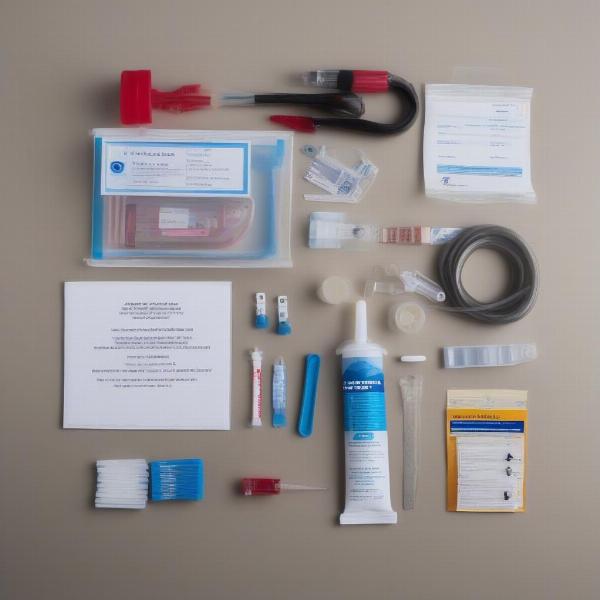Heartworm disease is a serious and potentially fatal condition affecting dogs worldwide. Early detection and treatment are crucial for a positive outcome. At-home heartworm tests for dogs offer a convenient and affordable way to screen your dog, but it’s important to understand their limitations and how to use them effectively. This article will guide you through everything you need to know about at-home heartworm tests for dogs, helping you make informed decisions about your pet’s health.
Understanding At-Home Heartworm Tests
At-home heartworm tests for dogs, also known as heartworm antigen tests, detect the presence of adult female heartworms. These tests work by identifying a specific protein (antigen) released by these worms into the dog’s bloodstream. These tests are relatively easy to use, requiring just a small blood sample from your dog, typically from the gum line. While convenient, these tests may not be as sensitive as those performed by a veterinarian.
 At-Home Heartworm Test Kit
At-Home Heartworm Test Kit
How Accurate are At-Home Heartworm Tests for Dogs?
At-home heartworm tests for dogs can be quite accurate in detecting adult female heartworms, especially if the infection is well-established. However, they can miss early-stage infections where the worms haven’t matured or haven’t produced enough antigen to be detected. False negatives can also occur if the test is performed incorrectly or if the sample is not properly collected. For these reasons, it’s crucial to follow the instructions carefully and consult with your veterinarian if you have any concerns.
When Should You Use an At-Home Heartworm Test?
At-home heartworm tests can be a valuable tool for screening your dog, particularly if you’re unable to visit the vet immediately or if you’re looking for a more affordable initial screening option. They can also be used between regular veterinary visits to provide added peace of mind. However, they shouldn’t replace annual heartworm testing performed by your vet, especially since your veterinarian can perform more comprehensive tests and provide necessary treatment if an infection is detected.
How to Use an At-Home Heartworm Test for Dogs
Using an at-home heartworm test is usually straightforward. The kit comes with detailed instructions, but the general process involves collecting a small blood sample from your dog’s gum line, mixing it with a provided solution, and then applying the mixture to the test cassette. The results typically appear within a few minutes. It’s essential to read the instructions carefully and understand how to interpret the results correctly.
What to Do If the Test is Positive?
If the at-home heartworm test is positive, you should immediately contact your veterinarian. A positive result indicates the presence of adult female heartworms, requiring prompt veterinary care and treatment. Your vet will likely perform additional tests to confirm the diagnosis and determine the severity of the infection before starting a treatment plan.
What to Do If the Test is Negative?
A negative result on an at-home heartworm test suggests that your dog doesn’t have adult female heartworms. However, it doesn’t guarantee that your dog is completely heartworm-free, as the test might not detect early-stage infections. It’s crucial to continue with your dog’s regular heartworm prevention medication as prescribed by your vet and follow up with annual heartworm testing at your veterinary clinic.
Conclusion
At-home heartworm tests for dogs can be a convenient and useful tool for screening, but they are not a replacement for professional veterinary care. They are best used in conjunction with regular veterinary checkups and heartworm prevention programs. Always consult with your veterinarian if you have any questions or concerns about your dog’s health or the results of an at-home heartworm test. Early detection and prevention are key to protecting your dog from this serious disease.
FAQ
- Can I use an at-home heartworm test on a puppy? Yes, but it’s crucial to consult your veterinarian first. Puppies can become infected with heartworms, but the test might not be reliable in very young puppies.
- How often should I test my dog for heartworms? Annual testing by a veterinarian is recommended, even if you use at-home tests.
- Are at-home heartworm tests expensive? They are generally less expensive than tests performed at a veterinary clinic.
- Can I treat heartworms at home? No, heartworm treatment must be supervised by a veterinarian.
- How can I prevent heartworms in my dog? Year-round heartworm prevention medication, as prescribed by your veterinarian, is the best way to protect your dog.
- Are at-home tests as reliable as vet tests? While at-home tests can be helpful, they may not be as sensitive as tests performed in a veterinary clinic and shouldn’t be relied upon solely for diagnosis.
- What are the symptoms of heartworms in dogs? In early stages, there may be no symptoms. As the disease progresses, coughing, fatigue, difficulty breathing, and weight loss can occur.
ILM Dog is your trusted resource for comprehensive information on dog care, health, training, and much more. We offer expert advice and guidance to help you provide the best possible care for your canine companion. From dog reactivity training minnesota to understanding the best dog beaches in sarasota fl, we’re dedicated to providing valuable insights. Whether you’re looking for a dog harness with led or advice on newport dog beach, or you’re interested in learning about pad heal for dogs, ILM Dog has the information you need. Contact us today at [email protected] or +44 20-3965-8624 for all your dog care needs. Visit ILM Dog for more information!